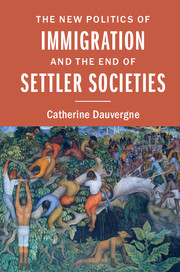Book contents
- Frontmatter
- Contents
- Acknowledgements
- Preface
- 1 Introduction
- 2 Settler societies and the immigration imagination
- PART 1 THE END OF SETTLER SOCIETIES
- PART 2 THE NEW POLITICS
- 6 Why economics and human rights are not enough
- 7 The loss of settlement and society
- 8 The close of the post-colonial
- 9 Contours and consequences of a new politics
- 10 Imagining immigration without a past – stories for the future
- Appendices
- Bibliography
- Index
7 - The loss of settlement and society
from PART 2 - THE NEW POLITICS
Published online by Cambridge University Press: 05 March 2016
- Frontmatter
- Contents
- Acknowledgements
- Preface
- 1 Introduction
- 2 Settler societies and the immigration imagination
- PART 1 THE END OF SETTLER SOCIETIES
- PART 2 THE NEW POLITICS
- 6 Why economics and human rights are not enough
- 7 The loss of settlement and society
- 8 The close of the post-colonial
- 9 Contours and consequences of a new politics
- 10 Imagining immigration without a past – stories for the future
- Appendices
- Bibliography
- Index
Summary
Immigration is no longer about “settlement” or “society.” It is because these two ideas have disappeared as immigration values that the demise of the settler society paradigm is a vital explanatory metaphor for contemporary migration. Under the logic of the settler society an organized immigration program was concerned with inviting people to settle – to stay permanently in a new place – and to build a society – at some level to assimilate, or at least adapt, to a wholly new culture or a wholly new transplant. To say that these two values have disappeared means that permanent settlement and the creation and adaptation of a new culture are no longer goals of migration policy. To the extent that these objectives persist, they are weakened and incidental. This chapter documents this shift and interrogates its consequences.
On the settlement side of the coin, the shift is visible in the slippage away from categories of “permanent” and “temporary” migration, toward a recognition that “circular,” “cyclical,” or “chain” migration are better descriptors of the dominant trends. From the state perspective, the shift away from settlement is expressed in a marked rise in preferences for temporary migration programs – involving primarily workers, but with consideration also of students – and a concomitant decrease in “permanent” migration numbers. This same shift away from permanence as a core immigration value is also seeping into those spaces where asylum and immigration converge.
On the society side of the coin, the demise of multiculturalism as an ideological force leaves in its wake a diversity-dotted landscape. Without the ideological promise of multiculturalism, a key part of the glue that makes many cultures into one “society” is gone. Diversity allows a space for incommensurability and neither expects nor demands assimilation. We see this shift most evidently in the rise in prevalence of ethnic enclaves within settler societies, a most recent shift that has preoccupied politicians, policy makers, and migration scholars. The same shift is visible in reduced funding for a variety of settlement services and also in the increased xenophobia that the fear of fundamental Islam has made socially and politically acceptable.
Settlement and society were true markers of the place of immigration in the settler society. These values have never been paramount in immigration programs of European states, even as those states have transformed themselves into nations of immigration over the most recent decades.
- Type
- Chapter
- Information
- The New Politics of Immigration and the End of Settler Societies , pp. 124 - 149Publisher: Cambridge University PressPrint publication year: 2016



